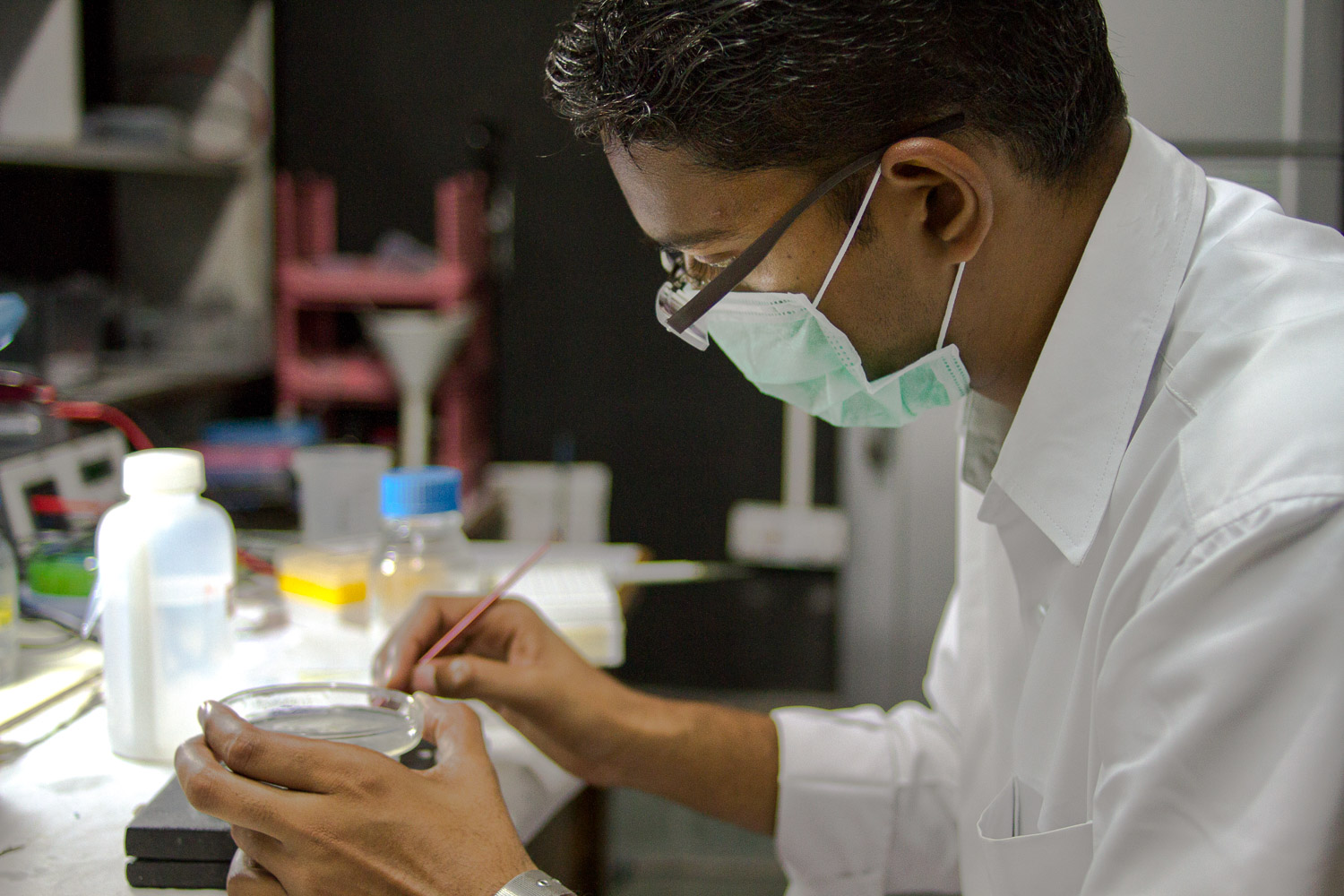
The curricula of the undergraduate and postgraduate programmes offered by the Department equip students with fundamental knowledge in both classical and advanced topics in the discipline of Life sciences. The courses are extensive and are updated regularly to keep students abreast of the latest developments in the field. Practical courses are designed keeping in view applications of the aspects covered in the theory courses. The department endeavours to produce postgraduate and doctoral students well-versed in the nuances of frontier areas in life sciences, both in terms of theoretical knowledge and hands-on laboratory skills.
The department is currently being supported by the prestigious UGC-SAP-DRS (level III); DST-FIST and DBT-BIF Infrastructural support programmes in addition to research grants obtained by individual faculty from various funding agencies. The department organizes colloquia, workshops, symposia and conferences to provide opportunities for students and faculty members to keep themselves updated about the latest trends in life sciences.
Vision
The vision of the Biosciences Department is two-fold:
- To equip students with fundamental knowledge of classical and advanced topics in Life Sciences
- To train students in modern, essential laboratory techniques and skills, with specialised focus on Molecular Biology, Biochemistry and Biotechnology
Programmes Offered
Postgraduate
M.Sc. in Biosciences
Research
Ph.D.
Facilities
The Department of Biosciences is equipped with state-of-the art facilities for research in areas such as:
Plant tissue culture
Animal cell culture
Molecular biology
Protein purification and charecterization
Microbiology (Mycology and Bacteriology)
Water quality studies
Plant secondary metabolites
The Department is equipped with general laboratories for routine class work in addition to specialized laboratories campus wise for focused research in Plant tissue culture and Animal cell culture; Mycology and Antimicrobial resistance, Molecular Biology and Biochemistry. Our state of the art instruments include PCR, RT-PCR, refrigerated centrifuges, ultra-centrifuge, multimode (UV-VIS-IT-Fluor) microplate reader (Spectramax M5), biosafety cabinets (BSL-II, A-2), qubit fluorometer, UV-VIS Spectrophotometer, fourier-transform infrared spectroscope(FTIR), fluorescence microscope suite, vertical and horizontal electrophoresis, chemi documentation system, fast protein liquid chromatography (FPLC), high pressure liquid chromatography (HPLC), incubators, refrigerated orbital Shakers, sonicators, luminometer, Ultra deep freezer (-80C), in addition to regular Refrigerators (+4C ) and freezers (-20C) and several other minor equipment.
The Department has the following laboratories for use by students across three campuses of the Institute:
Biotechnology Lab
Microbiology Lab
Botany Lab
Physiology Lab
Zoology Lab
Molecular Biology Lab
Biochemistry Lab
Plant Tissue Culture Lab
Faculty
Achievements & Participation 2019/20
Dr. B E Pradeep
Invited Speaker at International Symposium on Discovery of Actionable Targets in Infectious Diseases, Yenepoya University, Mangalore, 26 Nov 2019.
Invited speaker at MedTech Innovation day, Re-inventing Drug discovery by digitization & Novel technologies, Jubilant Biosys, Bengaluru, 6 Dec 2019.
Invited speaker for the symposium, ESKAPE pathogens, Centre for Infectious Disease Research, Indian Institute of Science, 21 Dec 2019.
Dr. A S Vishwanathan
Resource person for Lifesciences, Regional STEM Teacher Training Workshop on Research Based Pedagogical Tools, in collaboration with Indian Institute of Science Education and Research (IISER), Pune, Oriental University, Indore, 26-28 Jun 2019.
Resource person for Lifesciences, Regional STEM Teacher Training Workshop on Research Based Pedagogical Tools, in collaboration with Indian Institute of Science Education and Research (IISER), Pune, Sir Padampat Singhania University, Udaipur, Rajasthan, 17-19 Feb 2020.
Dr. S Venketesh
Invited lecture on Metabolic Rewiring promotes Amyloidogenesis in Huntington’s disease: Potential Biomarkers and Therapeutic Targets, Recent Trends in Biosciences, St. Peter’s Institute of Higher Education and Research, Chennai, 7-8 Aug 2019.
Mrs. B Anusha
Participated in the SAKURA Science Exchange Program (organized by the Government of Japan), Japan Advanced Institute of Science and Technology (JAIST), Nomi, Ishikawa, Japan, 16-25 Aug 2020.
Dr. (Mrs.) Pallavi C
Attended a workshop on Recent Trends in Bioinformatics for Exploratory Analysis of Biological Data, St. Francis College for Women, Hyderabad, 16-18 Jan 2020.
Completed an Online Certification Course, Descriptive Statistics with R Software, The National Programme on Technology Enhanced Learning (NPTEL), May 2020
Dr. Anandkumar K
Participated in a workshop by the International Association of Sai Vibrionics Practitioners, Prasanthi Nilayam, 17-22 Nov 2019, and have qualified as an Associate Vibrionics Practitioner.
Dr. K N Naresh
Attended a webinar on Herbals at Home for Health Management during Covid-19, The Maharaja Sayajirao University of Baroda, Gujarat, 9 May 2020.
Attended a webinar on The Science behind Covid-19, Harvard University, Cambridge, MA, USA, 24 Apr 2020.
Doctoral Research Scholars
Achievements & Participation 2019/20
Sri Balaram Khamari
First Prize in Poster presentation, 5th Annual South Zone Critical Care Conference, Visakhapatnam, Andhra Pradesh, 15-18 Aug 2019.
Sri Pachi Pulusu Chankya
Recipient of ICMR Senior Research Fellowship.
Students
Achievements 2019/20
Projects & Dissertations
Listed below are the postgraduate and professional programme projects and dissertations for the academic year 2018/19:
SSSIHL Projects & Dissertations – 2019/20 – M.Sc. in Biosciences
National Examinations
A high percentage of SSSIHL postgraduate students qualified in national exams such as the GATE/JEST or the CSIR-UGC NET in 2019/20. The list below includes the national rank for each exam (if available):
GATE
Jasa Ranjan Podh (Life Sciences & Life Sciences XL) – 568
Vasudeva Tati (Life Sciences XL) – 787
Sunirmala Sahoo (Life Sciences (XL) & Life Sciences) – 161
Kodam Pradeep (Life Sciences) – 2307
Srihari M (Life Sciences) – 4610
CSIR UGC-NET for JRF
Jasa Ranjan Podh (Life Sciences & Life Sciences XL) – 85
Ayushman (Life Sciences) – 59
Sunirmala Sahoo (Life Sciences (XL) & Life Sciences) – 59
Kodam Pradeep (Life Sciences) – 56
Srihari M (Life Sciences) – 70
Research Areas
To access the Research Areas for the department, click here.
Research Publications
The faculty and doctoral research scholars at SSSIHL actively contribute to a wide range of publications in esteemed peer-reviewed journals. A detailed department-wise list of these publications is available on the Research Publications page.
Funded Research Projects
Grant for Infrastructural Support to the Department of Biosciences
UGC SAP DRS III – ₹111 Lakhs (2018-2023)
Principal Investigator: Dr. B E Pradeep and Dr. S Venketesh
Thrust Areas: Health and Environment, and, Medically Active Natural Products
Augmenting Postgraduate Teaching & Research Facilities in Dept. of Biosciences
DST FIST – ₹88 Lakhs (2017-2020)
Principal Investigator: Dr. B S Vijayakumar
Augmenting Postgraduate Teaching & Research Facilities in Dept. of Biosciences by helping the students perform translational and applied research in the field of Biotechnology.
Perturbation in Metabolic pathways might drive Avascular Necrosis of Femoral Head by modulating bone biology: Mechanisms, Potential biomarkers and therapeutic targets
DST – ₹60.8 Lakhs (2018-2021)
Principal Investigator: Dr. S Venketesh
Avascular necrosis of the femur head (AVNFH) is a debilitating disease, which fall into three major categories: Alcohol induced, Steroid induced and idiopathic AVNFH. Clinically AVNFH is associated with impaired blood supply to the femoral head resulting in bone necrosis and collapse. The disease is characterized in some population by mutations in the MTHFR gene and elevated HC. We focus on the impairment in metabolic pathways leading to changes in HC, extracellular nucleotides and mechanisms that trigger the manifestation of AVNFH. Our data suggest an association of homocysteine pathway with AVNFH. Our model could explain all the observed symptoms and help to identify some of the events associated with AVNFH. Targeted metabolomic analysis shows elevated levels of metabolites belonging to methionine-HC, Polyamine and urea pathway as well as low levels of B12, B6 and Betain in AVNFH patients, which correlate with biophysical and histopathology of bone (Scientific Reports 2017). Further clinical and mechanistic studies are being carried out. The project will help to understand the biology of AVNFH, potential biomarkers and therapeutic targets to manage the disease.
Deliverables: The deliverables include the correlation of metabolic deregualtion with gene expression and biophysical changes in the AVNFH bone. To show the role of metabolites and cytokines like RANKL on osteoblast and osteoclast differentiation and function. To find potential biomarkers associated with disease progression and prognosis. To identify potential therapeutic targets.
Social Relevance: AVNFH is a debilitating disease which affect the productive age group between 30-50. The disease is progressive and eventually lead to total hip replacement. Hence biomarkers for early detection, progression and prognosis as well as newer therapeutic targets are imperative for managing the disease. The present project might help to achieve some of the objectives by providing a better understanding of AVNFH disease biology.
Mechanism of resistance involved in the emergence of nitrofurantoin resistance among uropathogenic enterobacteriaceae
Indian Council of Medical Research (ICMR) – ₹60 Lakhs (2020-2021)
Principal Investigator: Dr. B E Pradeep
Globally, urinary tract infections (UTI) are the most commonly encountered community and nosocomial infections and are a major cause of morbidity, significantly impacting health care related expenditure across all age groups. Enterobacteriaceae, which are gram negative, facultative anaerobic and non-spore forming bacteria, are most frequently associated with UTIs. Nitrofurantoin is recommended as the first line drug of choice for empirical treatment of uncomplicated UTIs involving Enterobacteriaceae. Of late, nitrofurantoin resistance (NR) is being reported among drug resistant Enterobacteriaceae. Very little information is available about the mechanisms employed by the pathogens in developing NR. Therefore, the proposed studies intend to fill a critical void in our understanding of the mechanisms involved in the development of resistance against one of the well tolerated antibiotics for the treatment of uncomplicated UTIs.
First, a total of 100 uropathogenic Enterobacteriaceae will be screened for the presence/absence of genes associated with NR. Second, mutations in the genes will be correlated with the resistance phenotype. Next, whole genome sequencing will be performed on select isolates to identify any novel genes/mechanisms that may have been employed to counter the antibacterial effects of nitrofurantoin. Knockout mutants will be generated and complementation assays will be performed to understand the role of the target genes in the emergence of NR. Growth curve analysis will be done to look at the fitness costs involved in the development of NR. RT-qPCR and nitro reductase activity assays will be performed to understand the genotype-phenotype relation and to delineate the signaling mechanisms underlying the emergence of NR.
The proposed study would help in understanding the mechanisms involved in Nitrofurantoin and hence may be useful in developing ways to combat the rise of Antimicrobial resistance.
Doctoral Research Scholars
Sri Prasanth Ghanta
Plant Biotechnology and Phytochemistry
Supervisor: Prof. R Basavaraju
Sri Sai Krishna S B
Rheumatoid Arthritis, Biomarker Discovery, Systems Biology, Metabolomics, Mechanistic Studies
Supervisors: Dr. S Venketesh and Dr. Prakash Kanchandani
Sri Mukul Anand
Plant biotechnology
Supervisor: Prof. R Basavaraju
Sri Thota Sai Manohar
Neurobiology
Supervisor: Dr. S Venketesh
Sri Abhinav Prakash Nair
Systems Biology of Diseases (Cardio-biology)
Supervisor: Dr. S Venketesh
Sri Kottapalli K Jayant
Fungal Biotechnology
Supervisor: Dr. B S Vijayakumar
Sri Skanda S
Fungal Biotechnology
Supervisor: Dr. B S Vijayakumar
Sri Ashwin Ashok Naik
Disease Biology
Supervisor: Dr. S Venketesh
Sri Balaram Khamari
Molecular Microbiology, Antimicrobial Resistance
Supervisor: Dr. B E Pradeep
Sri Manmath Lama
Molecular Microbiology, Bacterial Genomics
Supervisor: Dr. B E Pradeep
Sri Pachi Pulusu Chankya
Molecular Microbiology, Antimicrobial resistance, Genomics
Supervisor: Dr. B E Pradeep
Sri Roshan Rai
Molecular Microbiology
Supervisor: Dr. B S Vijayakumar
Sri Sai Sanwid Pradhan
Systems Biology of Diseases
Supervisor: Dr. S Venketesh
Sri Saiswaroop R
Neurobiology
Supervisor: Dr. S Venketesh
Sri R Sriram
Systems Biology of Diseases
Supervisor: Dr. R Sai Sathish and Dr. S Venketesh
Sri Utkarsh Bele
Microbial Biotechnology and Wastewater Treatment
Supervisor: Dr. B S Vijayakumar
Sri V M Datta Darshan
Protein Biology
Supervisor: Dr. S Venketesh
Sri Sahashransu Satyajeet Mahapatra
Wastewater treatment and reuse
Supervisor: Dr. A S Vishwanathan
Sri Arun Sai Kumar Peketi
Understanding the mechanisms of Colistin resistancee in Bacteria
Supervisor: Dr. B E Pradeep
Sri Sudam Bhoi
Protein Structure and Function
Supervisor: Dr. K N Naresh
Sri Mukkirla Bhargava Sai
Molecular Biology
Supervisor: Dr. Anandkumar K
Sri Piyush Kumar
Bioactive compounds of endophytic fungi associated with medicinal plant
Supervisor: Dr. V N S Malleswara D Kota


